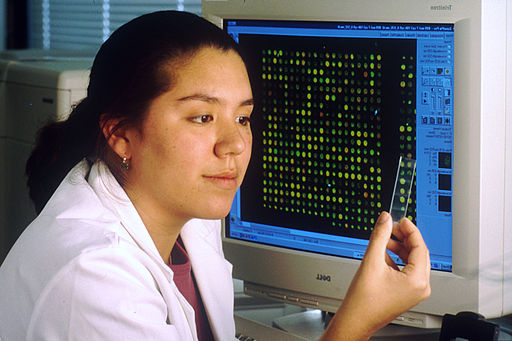More Gut-Wrenching Decisions About Abortion Due to Advanced Prenatal Testing
By Bonnie Rochman,
KQED
| 11. 06. 2017
Excerpts from “The Other Scarlet ‘A’: Abortion’s Relationship to Genetic Testing” from THE GENE MACHINE by Bonnie Rochman.
When the second purple line appeared on the white plastic wand on a March morning in 2002, I knew next to nothing about pregnancy and even less about raising a child. It was years before I’d go on to cover parenting and pediatrics, and write about sequencing children’s genomes. Yet from the first days of that pregnancy, I was already enmeshed in the most cutting-edge technologies of the time, thanks to my friend Tali, whose son was due a week after mine.
Tali had recently moved to my home state of North Carolina from Israel, where nuchal translucency testing was standard. I had no idea what it was, but I figured it was important, judging by her level of outrage that this test to gauge Down syndrome risk — combination of an ultrasound to measure the collection of fluid under the skin on the back of a fetus’s neck, and a blood draw — wasn’t commonly available in the United States. Within days, she told me...
Related Articles
By Diaa Hadid and Shweta Desai, NPR | 01.29.2026
MUMBRA, India — The afternoon sun shines on the woman in a commuter-town café, highlighting her almond-shaped eyes and pale skin, a look often sought after by couples who need an egg to have a baby.
"I have good eggs,"...
By Roni Caryn Rabin, The New York Times | 01.22.2026
The National Institutes of Health said on Thursday it is ending support for all research that makes use of human fetal tissue, eliminating funding for projects both within and outside of the agency.
A ban instituted in June 2019 by...
By Steve Rose, The Guardian | 01.28.2026
Ed Zitron, EZPR.com; Experience Summit stage;
Web Summit 2024 via Wikipedia Commons licensed under CC by 2.0
If some time in an entirely possible future they come to make a movie about “how the AI bubble burst”, Ed Zitron will...
By Mike McIntire, The New York Times | 01.24.2026
Genetic researchers were seeking children for an ambitious, federally funded project to track brain development — a study that they told families could yield invaluable discoveries about DNA’s impact on behavior and disease.
They also promised that the children’s sensitive...




